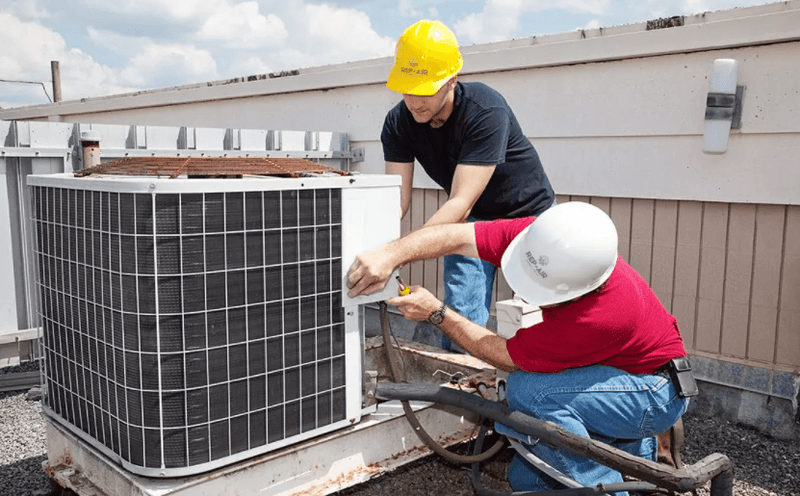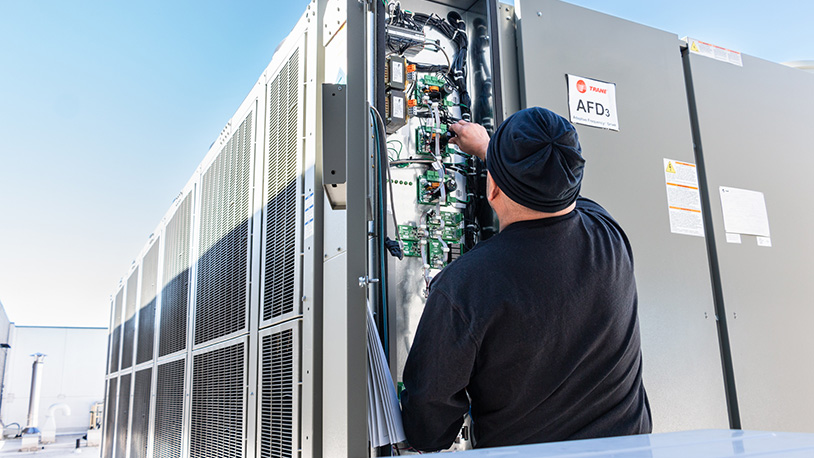Discover how HVAC experts offer regular checkups for systems
Wiki Article
Checking Out the Important Elements of a Reliable HVAC System
An efficient cooling and heating system is constructed on a number of vital components that operate in consistency. Each component, from the thermostat to the ductwork, plays an important role in maintaining convenience and power performance. Understanding these components is crucial for enhancing performance and enhancing interior air quality. As one checks out these components, the elaborate relationships in between them reveal insights right into boosting overall system efficiency. What details aspects contribute most to this performance?The Function of the Thermostat in Cooling And Heating Performance

Typically forgotten, the thermostat plays a critical function in the effectiveness of Heating and cooling systems. This small gadget works as the key control center, managing temperature settings and making certain optimal convenience within a room. By accurately noticing the ambient temperature, the thermostat communicates with the air flow, home heating, and air conditioning systems to keep the wanted environment
An effective thermostat decreases power intake by triggering the HVAC system only when necessary, thus preventing too much heating or air conditioning. Modern wise and programmable thermostats improve this effectiveness even more by allowing users to set timetables and remotely adjust settings, adjusting to everyday regimens.
Moreover, the positioning of the thermostat is necessary; incorrect location can lead to imprecise temperature analyses, causing ineffective operation. Generally, a well-functioning thermostat not just improves convenience but also adds markedly to energy savings and the durability of the a/c system.
Recognizing the Importance of Air Filters
Air filters offer an important feature in HVAC systems by ensuring that the air flowing within an area continues to be healthy and tidy. These filters trap dirt, allergens, and other toxins, preventing them from being recirculated throughout the atmosphere. By catching these particles, air filters add to boosted interior air top quality, which can significantly profit passengers' health and wellness, particularly those with allergies or breathing problems.In addition, maintaining tidy air filters enhances the effectiveness of a/c systems. Stopped up filters can restrict air flow, causing the system to function more challenging to maintain preferred temperature levels, leading to increased power usage and higher energy costs. Regularly changing or cleaning up filters is an important maintenance step that can prolong the life expectancy of cooling and heating devices. Eventually, recognizing the value of air filters allows property owners and structure supervisors to take aggressive actions to assure a well-functioning, reliable HVAC system that advertises a risk-free and comfortable indoor setting.

The Performance of the Heater and Heatpump
Heaters and heatpump are crucial elements of heating and cooling systems, in charge of providing warmth throughout cooler months. Furnaces operate by heating air via burning or electrical resistance, after that dispersing it throughout the home by means of ducts. They normally supply fast heating and can be sustained by all-natural gas, power, or oil, depending on the system type.Conversely, heat pumps move warm instead of generate it. They remove warm from the outdoors air or ground, even in low temperatures, and move it indoors. HVAC experts. This twin capability enables heatpump to additionally offer air conditioning in warmer months, making them flexible alternatives for year-round climate control
Both systems require correct maintenance to assure effectiveness and long life. While heaters master severe cool, warmth pumps can be advantageous in modest climates. Comprehending their distinct capabilities aids homeowners in choosing one of the most suitable alternative for their heating needs.
Checking Out the Air Conditioning System
The air conditioning system is a crucial component of cooling and heating systems, offered in different types to suit different needs. Understanding the effectiveness ratings of these units is necessary for making notified selections about energy intake and cost. This area will certainly check out the varied sorts of air conditioning unit and clear up just how performance rankings impact efficiency.Sorts Of Air Conditioners
While numerous factors affect the selection of a/c systems, comprehending the various types available is vital for home owners and structure supervisors alike. Central air conditioning conditioners are made to cool down entire homes or buildings, using a network of ducts for air flow. Home window devices offer an even more local service, ideal for tiny rooms or solitary rooms. Mobile a/c supply versatility, allowing users to relocate the system as needed. Ductless mini-split systems are another alternative, integrating the effectiveness of central systems with the comfort of zoning, as they call for no ductwork. Finally, geothermal systems harness the earth's temperature level for energy-efficient air conditioning. Each kind includes distinct benefits, making informed selections important for effective environment control.
Effectiveness Scores Discussed
Recognizing effectiveness rankings is vital for choosing the ideal cooling device, as these metrics hop over to these guys supply insight right browse around this web-site into the system's efficiency and energy consumption. One of the most typical score for a/c unit is the Seasonal Energy Efficiency Ratio (SEER), which measures the cooling result throughout a common air conditioning period separated by the complete electrical power input. A greater SEER indicates far better effectiveness. Furthermore, the Energy Effectiveness Proportion (EER) is used for measuring effectiveness under certain conditions. Another crucial metric is the Power Celebrity qualification, which represents that a device meets stringent power efficiency guidelines. By examining these ratings, consumers can make enlightened choices that not just optimize convenience but likewise minimize energy costs and environmental influence.The Importance of Ductwork and Airflow
Reliable ductwork design and air flow management play vital roles in the general efficiency and efficiency of cooling and heating systems. Appropriate ductwork assurances that conditioned air is dispersed equally throughout a room, decreasing temperature changes and boosting convenience. Well-designed ducts reduce resistance to airflow, minimizing the workload on cooling and heating devices and eventually lowering power usage.Air flow monitoring includes tactically positioning vents and registers to boost the circulation of air. This prevents common problems such as cool or hot spots, which can occur when airflow is obstructed or inadequately well balanced. In addition, the ideal air duct materials and insulation can even more improve performance by reducing heat loss or gain during air transit.
An efficient ductwork system not just contributes to energy cost savings yet can also extend the life-span of cooling and heating tools by minimizing unneeded stress (HVAC experts). Understanding the relevance of ductwork and airflow is important for attaining peak A/c system efficiency.
Normal Upkeep Practices to Boost Performance
Normal maintenance techniques are important for making certain peak performance of cooling and heating systems. These methods consist of regular examinations, cleaning, and essential repair services to maintain the system running effectively. Routinely altering air filters is vital, as clogged up filters can block air movement and reduce performance. Furthermore, specialists ought to examine and clean evaporator and condenser coils to stop overheating and power wastage.Annual expert examinations are also advised, as experienced technicians can determine prospective concerns prior to they rise. Lubricating relocating parts lessens wear and tear, contributing to a much longer life-span for the system. Guaranteeing that the thermostat functions properly help in preserving perfect temperature control.
Regularly Asked Questions
Exactly how Frequently Should I Change My Thermostat?
Thermostats ought to normally be changed every 5 to click here for more one decade, depending upon usage and technology advancements. Routine checks are advisable to assure peak performance, specifically if experiencing inconsistent temperature control or increased power costs.What Size Air Filter Is Finest for My Cooling And Heating System?
The very best size air filter for an a/c system varies by unit style. Usually, it's crucial to speak with the proprietor's handbook or check the existing filter dimensions to guarantee peak efficiency and air high quality.Can I Install a Heatpump Myself?
Mounting a heat pump independently is possible for skilled people, yet it needs expertise of electrical systems and regional codes. Employing a specialist is suggested to assure appropriate installment and optimal system efficiency.Exactly how Do I Know if My Ductwork Is Reliable?
To identify ductwork performance, one should check for leakages, action airflow at vents, examine insulation quality, and evaluate temperature distinctions in between supply and return air ducts. Specialist assessments can provide thorough understandings into overall efficiency.What Are Signs My Cooling And Heating Needs Immediate Maintenance?
Signs that a heating and cooling system requires immediate upkeep include uncommon noises, inconsistent temperatures, enhanced power costs, unpleasant smells, and regular biking. Addressing these concerns without delay can protect against more damage and warranty top system performance.Air filters serve a vital feature in Cooling and heating systems by assuring that the air circulating within a room stays clean and healthy. Furthermore, preserving tidy air filters improves the efficiency of Heating and cooling systems. Ductless mini-split systems are an additional option, combining the performance of central systems with the benefit of zoning, as they call for no ductwork. Understanding efficiency ratings is essential for choosing the ideal air conditioning unit, as these metrics offer understanding into the system's efficiency and energy consumption. The best dimension air filter for a Cooling and heating system varies by device layout.
Report this wiki page